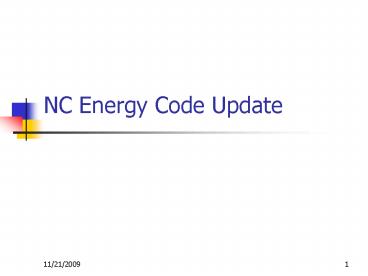NC Energy Code Update - PowerPoint PPT Presentation
1 / 17
Title:
NC Energy Code Update
Description:
Presenter: Billy Hinton Code Official for the State of North Carolina. 11/12/09. 3 ... North Carolina Energy Code Update. Adoption of the 2000 ICC Codes ... – PowerPoint PPT presentation
Number of Views:30
Avg rating:3.0/5.0
Title: NC Energy Code Update
1
NC Energy Code Update
2
Introduction
- Activities ongoing in North Carolina
- Presenter Billy Hinton Code Official for the
State of North Carolina
3
Topics for Discussion
- North Carolina Energy Code Update
- Implementation Challenges
- Participation in the ASHRAE and ICC processes
4
North Carolina Energy Code Update
- Adoption of the 2000 ICC Codes
- Includes adoption of the 2000 IECC
- Includes adoption of the 2000 IRC, chapter 11
5
North Carolina Energy Code Update
- Substantive NC amendments to the IECC
- Adoption of ASHRAE 90.1-1999
- No trade-off allowed for reduction of envelope
requirements when using high efficiency HVAC
equipment for one and two family dwellings and
townhouses unless IECC Chapter 4 analysis is
performed - Deletion of SHGC requirements for one and two
family dwellings and townhouses
6
Implementation Challenges
- Training is needed for the new codes for
- Design professionals
- Contractors
- Code officials
- The NC Energy Division and the US DOE are
important partners - Workshops are possible through US DOE grant
funding - Technical assistance has been provided from
Pacific Northwest National Laboratory and BCAP
7
Implementation Challenges
- Thanks to the US DOE PNNL for the COMcheck and
MECcheck compliance tools - Ease of use
- Future wishlist for enhancements
- Wizards
- Extension to ASHRAE 90.1-1999
8
Participation in the ASHRAE and ICC Processes
- Two distinctly different processes
9
Participation in the ICC Code Change Process
- ICC Mid Year Hearing and the Annual Meeting
Hearing - Timely disposition of code change proposals
- Process schedule limits debate and exploration of
the issues - Not a consensus process
10
Participation in the ASHRAE Process
- ASHRAE Winter Annual Meetings and the
Continuous Maintenance Process - Procedurally a time consuming process
- Time is allowed for a complete analysis,discussion
, and debate of the issues - The ASHRAE process is a consensus process
11
Observations of the Two Processes Compared
- The ICC process is faster, but it limits debate
of the issues and does not achieve consensus. - The ASHRAE process is slower, but it is more
thorough. Issues are explored in more detail and
proposals must be shown to have both technical
and economic merit. - The ASHRAE process does achieve consensus.
12
Opportunities for ASHRAE
- ASHRAE is a technical leader and has an
opportunity and the expertise to make significant
contributions in the codes arena.
13
Opportunities for ASHRAE (Continued)
- ASHRAE has been and continues to be a leader in
the development of technical standards for use by
engineers. The new challenge is to produce
standards intended for codes that identify
minimum code requirements that can be easily
understood and applied by the user, implemented
by the contractor, and enforced by the code
official.
14
Benefit of Working on the ICC and ASHRAE
Committees
- Working on these committees has provided valuable
insight into the basis and justification of
requirements contained in codes and standards.
This has been beneficial to our efforts in
developing a new energy code for the state of
North Carolina. - It has also been beneficial to provide input to
the ASHRAE Project Committees on the needs of
less technical users and code enforcement
personnel.
15
Benefit of Working on the ICC and ASHRAE
Committees
- The ASHRAE 90.1 and 90.2 Project Committees are
considering improvements to make these standards
easier to use and enforce as well as identifying
additional opportunities for energy savings that
are technically and economically justified.
16
Benefit of Working on the ICC and ASHRAE
Committees
- Codes identify minimum requirements necessary for
life safety and the general welfare of the
public. The ASHRAE code intended energy
standards 90.1 and 90.2 identify minimum
requirements that have been technically and
economically justified to provide for the general
welfare of the public.
17
2001 National Workshop on State Building Energy
Codes
- Thanks for the opportunity to share this
information with you today.































